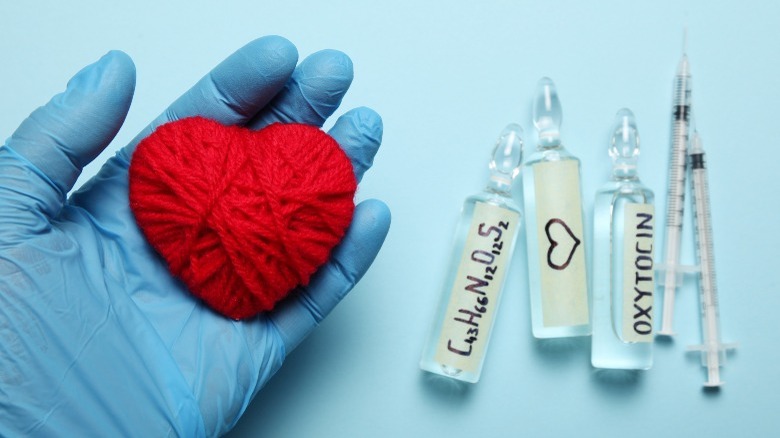Can The 'Love Hormone' Oxytocin Heal A Broken Heart?
The heart's a part of the circulatory system that pumps blood throughout the body, delivering vital oxygen found in blood, says Cleveland Clinic. It also regulates heart rate and blood pressure. The heart is a vital organ, and damage to it can lead to health complications and death. In America, it is estimated that acute myocardial infarctions, or heart attacks, cause over 1 million deaths per year (via StatPearls). It is thought that most heart attacks are caused by underlying coronary artery disease, which is tied to risk factors, like poor diet, lack of exercise, smoking, and stress (per StatPearls).
Heart attacks require immediate medical attention and are considered an emergency, says National Health Services. Common treatments for a heart attack include medications that break down clots in the blood and even surgery. However, researchers may have found a new way to help the heart heal itself after suffering a heart attack using oxytocin. Oxytocin, commonly known as the "love hormone" for its role in love, is a biochemical produced in the brain and released into the body via the bloodstream (per Psychology Today). Oxytocin is associated with a number of functions that range from childbirth and social behavior to new cell growth and protection against stress, according to Psychology Today.
Oxytocin, what can't it do?
Now, oxytocin is being explored as a potential therapy for promoting new cell growth in the heart, particularly after a heart attack. A 2022 study published in the journal Frontiers in Cell and Developmental Biology notes that a heart attack can cause damage to the cells of the heart, but they can be regenerated via a healing process that starts with the outer layer of the heart. However, this process on its own does not lead to "significant regeneration" in mammals. The researchers found that oxytocin could — in zebrafish and cell cultures from humans — promote cells produced in the outer layer of the heart to move to the middle layer (via Neuroscience News).
In short, oxytocin may help enable what the senior author of the study, Dr.Aitor Aguirre, calls "heart repair mechanisms." It turns out that oxytocin is biologically and developmentally intertwined with the heart. A 2013 study published in the journal EMBO Reports notes that not only do precursors for oxytocin play a role in fetal heart development, but oxytocin also helps protect the heart from stress and even self-heal. In turn, oxytocin may also help mend the heartache from a broken heart — the kind you get from a lost loved one or ended romance.


